China by tour or plan and go independently? Here’s how to decide
China famously has about 20% of the world’s population, but it hasn’t been a tourist hot-spot for most outsiders. I knew I had to see it for myself so in September of 2017 I painstakingly planned a 14-day visit there. At first I considered doing it on an organized tour because that’s how the vast majority of people visit this huge country, but in the end I decided I should try to do it myself so I’d know how easy or difficult it really was.
It turned out to be more difficult than I had imagined, although certainly not impossible and I very much enjoyed my trip. I’ve now been to just about every major destination in Asia and I was surprised by how different visiting China was compared to the rest. If you are thinking about visiting China you absolutely should. If you are wondering whether to plan it and go on your own or go on an organized tour, I think you’ll find the information below useful in making your decision.
The short version: Most people should do a tour, but there are exceptions

For the reasons I’ll discuss below, China is not like other countries. The short version is that it takes a LOT of research and work beforehand and quite a bit of stress when you are there to see the main highlights. Stranger still, you’ll be surrounded by tour groups once you get to the main sights, whether you are on a tour or not. It’s just that the tour groups had a much easier time of it because all of the complicated arrangements were made for them, and a guide was there to make sure they were in the right places.
Why are you visiting China? This matters most

But if you are like the other 99% of us and your main goal is to see China for yourself, and especially visit the Forbidden City, Great Wall, Terracotta Warriors, karst hills along the Li River, and see the skyscapers of Shanghai, it’s MUCH easier to do that on a tour. There are small-group tours with between 8 and 20 people that aren’t much more expensive than the tours with 40 people on them, so you don’t have to be part of a zoo in order to see the best of China on a tour.
English isn't widely spoken, and it's more of an issue than most other places
Perhaps the most shocking thing I encountered on my two-week independent trip to China was how “Western” tourists are basically ignored wherever we go. When I say “Western” I mean almost all tourists from outside of China, as we nearly all speak English as our lingua franca.
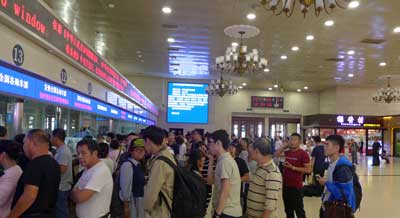
The fact that so many Western visitors are also part of tour groups means that even restaurants and hotels usually don’t have to bother with English menus and signs, because their guide will take care of that for them. As an experienced tourist it’s an unusual feeling to be identified as a Westerner and therefore ignored. So on one hand it’s refreshing, but on the other hand it can be frustrating as if you were deaf and mute.
By the way, the Chinese alphabet is not one of those that can be picked up casually in a week or two before your trip. For most people, it’s just random-looking box patterns that all look quite alike.
Independent travelers and tour groups end up in the same places anyway

Again, one of the main issues is that even China’s tourist cities are mostly impenetrable to those who don’t speak the language. If you learn about some small and obscure museum or cafe, chances are very high that English will be of no use to you when you eventually find it.
Tours can actually be cheaper for the same things
When considering a tour or going on your own it’s also important to factor in the prices of each. In almost anywhere else in the world, going independently is cheaper for the same things, as long as you plan well. But amazingly enough, China tours can be much cheaper than going on your own, although it’s still important to compare for yourself.

Tours to China will usually include most hotel breakfasts and some lunches and dinners. Where these are included, you’ll usually get buffet or family-style service where each person helps themselves from big plates and bowls. This is also very common among Chinese tourists, and it’s cheaper per person than ordering a la carte from restaurants you find yourself.
China independently takes a LOT of research and some stress

Once you have your visa sorted out, you have to figure out which cities in China you want to visit. It would be crazy to go to all that trouble and the long flight and then only visit Beijing, so the most popular visits are Beijing and Shanghai or Beijing, Shanghai, and Xi’an. If you have more time you’ll probably want to add in Guilin (all of these are covered below), or a Yangtze River cruise, and some tours also include Hong Kong and Taipei, even though they aren’t technically in the same China.
You could read the China Lonely Planet from cover to cover, and if you only have three weeks or less you’ll probably end up doing one of the itineraries mentioned above in the end. If you check the popular itineraries from the main China tour companies, you’ll see all of those exact same itineries. Many of them will move faster than you’d prefer (2 days in each city), but you can actually see a lot in a short time if you’ve got a bus waiting for you at every stop.
If you are NOT on a tour you’ll be on your own to figure out how the metro systems and local bus networks work for tickets and transfers. They are mostly straightforward, but this can be fairly stressful since you will likely be the only non-Chinese speaker there at the time.
Public transportation can be tricky, and taxis can be even more difficult. Uber is banned in China (as of this writing) and public taxis won’t stop for you under most circumstances. They (justifyably) know from experience that if they stop for a non-Chinese person, chances are very high that they won’t be able to understand you and it will waste a lot of their time.
The good news is that a Chinese app similar to Uber called Didi Dache bought Uber’s China operations in 2016, and in 2017 they launched an English-language version of the app. I’m told that English-language customers can input their destination in English and it automatically gets translated for the driver. I didn’t try it myself, but an expat friend of mine in Beijing said it works well.
How to prepare for your China trip
Sort our a visa
As mentioned above, the procedures for a China visa are more expensive and more complicated than virtually any other tourist-friendly country in the world. There are agencies that can help you and are probably a wise investment. I used one that has offices near each consulate in the US, and they were very helpful when the Chinese consulate first rejected my application and asked me to include another form. This service added another US$150 or so to the price, including Fedexing my actual passport back and forth.
Decide where you want to go and how you’ll get there
When you apply for a visa they will ask to see your inbound and outbound flight confirmation, as well as your hotel reservations in China. For the most part you need to have these locked in before you even get approved for the visa, although I’ve heard of backpacker types being allowed in and wandering around for a couple months.
Sign up for and download a VPN app for your mobile devices and laptop
You may have heard of the so-called Great Firewall of China, which blocks residents from access to Google, Facebook, Twitter, and many other services that you might use on a regular basis. If you want to be able to use any of these you’ll need to get a VPN (virtual private network) app on your smart phone, tablet, and lap top if you bring them.
It’s obvious that the Chinese government is aware that many tourists use VPNs during their visits, and they usually look the other way. Evidently the goverment sometimes shuts down the VPNs in the run-up to official meetings and events, but it seems that most of the time a VPN will work fine. Their goal appears to be to keep the citizens from being able to readily access outside services that might suddenly turn against the official news of the Chinese government.
After a fair amount of research I chose ExpressVPN, which seems to be the most popular service and worked on all of my devices. It’s not cheap, but it’s much better and more reliable than other VPN services I’ve used before.
A brief summary of the major China highlights
China is obviously a huge country, but most of it is of little interest to first-time visitors. The language barrier also makes it very difficult to just roll into a random city and get by as a non-Chinese speaker. Below are the most popular destinations for first-time visitors to China.
Beijing
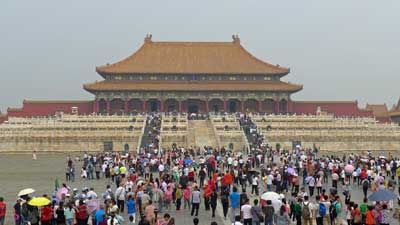
The Beijing air quality is famously bad (although evidently getting better), and it’s actually among the more challenging cities to visit. If you book into a hotel with an English-language version of their website, chances are strong that at least the front desk people and the concierge will speak enough English to help you out. But even in Beijing, English is not widely spoken by most people in the hospitality industry or most restaurants.
It’s also worth mentioning that Beijing is mostly a low-rise city and it’s very spread out. As a result it’s not as walking-friendly as the other cities below. The metro system is cheap and fairly easy to use, with all signs in English, but since the city is so spread out it might mean that the restaurant or shop that you want to visit is still a 15 minute walk from the nearest metro stop.
>>>Beijing prices, weather, and travel tips
Shanghai
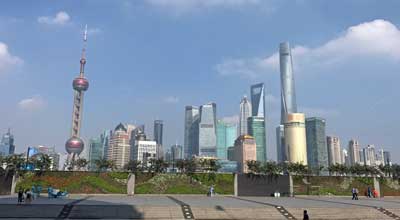
Another major difference between Beijing and Shanghai is that Shanghai has a wide river at its core, with the riverfront Bund neighborhood on one side and the futuristic skyscrapers and shopping malls on the other side. Shanghai is also much more vertical than Beijing and it’s much more of a walking city. It does have its own modern and easy to use Metro system, as well as reasonably priced taxis.
I spent 4 days in Beijing and 4 days in Shanghai and even though Beijing has its classic sights that I enjoyed, I had a much better time in Shanghai and if I had to live in China for some reason there is no question that I’d choose it over all the others.
>>>Shanghai prices, weather, and travel tips
Xi’an
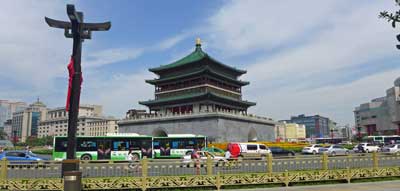
The area around the Bell Tower in the center of the walled city is fairly tourist friendly, but the city itself isn’t as charming as you might expect. Most people seem to come here primarily to visit the Terracotta Warriors, which are about an hour outside the center by bus or taxi. The story of the Warriors is among the most amazing archeological finds in the world and I’m a big fan of it. But to be honest, visiting the huge complex where the dig continues felt somewhat dull to me. For hardcore travelers seeing the Warriors is a major bucket list item, but if it doesn’t mean that much to you I would probably skip Xi’an.
The surprising highlight of Xi’an for me was the Muslim Quarter neighborhood, which is like an ongoing outdoor food festival with excellent snacks and street food meals. The nearby Bell Tower and Drum Tower are worth a look, even if they are very similar to each other.
>>>Xi’an prices, weather, and travel tips
Guilin

All of that said, Guilin itself actually has many similar karst hills in the middle of the city and it’s one of the most scenic places I’ve ever visited. It’s extremely popular among domestic Chinese tourists, but also popular enough among non-Chinese that getting by in English isn’t as difficult as in Beijing or Xi’an. Another big tourist attraction is a huge set of rice terraces in some nearby mountains, and they are also some of the most amazing things I’ve ever seen in person.
If someone was planning a visit to Beijing and Shanghai and wanted to add in one other stop, I’d suggest Guilin by far over Xi’an. It’s a large and busy city, but the tourist district between the four lakes and the central square is very friendly and nice. Xi’an is a huge (and not charming city), while Guilin is unique in all the world. Hotel prices here are also very modest considering the quality. We include Guilin on our list of the best unusual holiday destinations around the world.
A few other places that are often bundled into China tours
Each of the places listed below can be reached without a special China visa, but most China visas are issued with two entries so that visitors can exit to one of these places and then come back into China on the same trip if they like.
Hong Kong
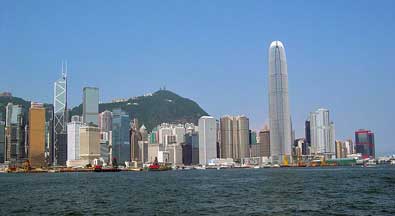
Since Hong Kong was run by the British until 1996 it’s no surprise that English is pretty common here, and especially at hotels and most restaurants. The food is excellent, as long as you like Asian cuisines in general. If you are thinking about adding Hong Kong to a China trip and you don’t think you’ll have a chance to visit otherwise, I would highly recommend it.
>>>Hong Kong prices, weather, and travel tips
Macau
This former Portuguese colony is a one-hour ferry ride from Hong Kong and now it’s known as by far the biggest gambling destination on the planet. Most of the city is older and similar to older areas in Hong Kong, while another area resembles a much smaller version of the Las Vegas Strip, with a cluster of huge hotel-casinos and wide streets.
Non-Chinese people who are looking for Las Vegas-style fun won’t find it here. There is very little drinking in the casinos and there are very few shows. The main attraction is the giant casinos themselves, and almost everyone inside is playing baccarat exclusively. Overall I don’t think it’s very interesting for most non-Chinese.
>>>Macau prices, weather, and travel tips
Taipei

This is another city that foodies gush about, and I found plenty of reasons why on my own visit. The huge and famous museum here actually holds many of China’s most important antiquities, so it’s a good place to supplement your Chinese history knowledge.
Overall it’s hard to recommend Taipei unless you already have a specific reason to come. English isn’t widely spoken and it’s quite a bit like China’s big cities in that those who don’t speak Chinese will find very limited choices when it comes to restaurants and other cultural offerings.

My wife and I are goinng to China in April 2020 and will join a group tour. We are considering an 11 day tour to include Beijing, Xian, Guilin Yangshuo and Shanghai. We have come down to 2 companies, ONTHEGOTOURS and TRAVEL CHINA GUIDE and would like to know if these are reputable companies
Frank,
That sounds like a great trip and I think booking a tour is wise. To be honest, I’d never heard of either of those tour companies, but that’s mostly because I focus on independent travel. I just checked them both out and they both look legit, with plenty of reviews and outside references. I think I’d be comfortable booking with either of them, although there are no guarantees that something won’t go wrong even if you book with the most famous tour company.
Another reason I’d feel confident enough is that tours in China are a huge business and most things seem to operate quite efficiently. The trains and planes are nice and generally go on schedule. If you were going to India, for example, there is much more room for things to go wrong because sometimes the trains are very late and there are plenty of sub-standard hotels and all that. You might look for other opinions, but at least at first glance they look really solid. Best of luck on this. -Roger
16/06/2019
Hi Roger
Many thanks for this very informative and easy to read blog. My friend and I are Australian, fit, young minded, mature aged ladies and we did briefly think that we could negotiate China independently. We planned and researched our amazing visit to India albeit mainly Rajasthan without a hiccup. However as you rightly pointed out visitors to India are welcomed with open arms!! Thankyou for giving us your honest well considered thoughts and ideas about China and organised tours v’s independent travel. We will now be visiting on an organised tour preferably in a small group! “Follow the red umbrella” here we come!!
Gwynneth,
I’m glad I was able to help. As I mention in the article, I’d recommend independent travel to almost any other country, including India. It’s just that China is unique in that English-speaking tourism is such a tiny fraction of their market that they really don’t go out of their way to make it easy. In every other country the English-speaking tourists dominate so they really have to cater to us. Have a great trip. -Roger
China is my dream trip. My primary purpose would be to see one (or more) of the Giant Panda research centers. Maybe even do the volunteer day that they offer. I would want to see a few other sites as well, so travel within the country would be necessary. Except for Canada, which I can get to in 30 minutes from my home in Michigan, my husband and I have never been out of the country. Would you consider China too complicated as a first overseas trip? Should we start with a more tourist friendly locale to get our feet wet? My husband doesn’t have the over powering wanderlust that I do, so I don’t want a bad experience to prevent more travel in the future, but we also have to scrimp and save to be able to do any trip at all, so out of the country travel would have to be few and far between. Thank you! I know from your article that I would definitely prefer a tour over trying to muddle through it alone.
Patty,
I’m glad the article was helpful. I actually do think that doing China on your own could be a frustrating experience for the reasons mentioned in the article. Almost no one speaks English, except for a bit of English by some merchants that get foreign customers at times. But as mentioned in the article, the tours are quite cheap and they offer very good value so I think that could be ideal for you.
And as someone who literally does this for a living and spent dozens and dozens of hours researching and planning my own trip, I just don’t think there is enough of a payoff to go through that and then end up visiting the same places as the tour groups anyway. I travel internationally a lot, of course, and China was one of the most challenging countries to visit on my own. Hong Kong is quite a bit easier by the way. It’s not that China is or feels dangerous, it’s more that it’s just confusing and there aren’t many people around to help you if you don’t speak Chinese. Let me know if you have any other questions. -Roger
I’m in a situation in which my mother and brother, and my husband and I, are split on whether or not to do a tour. The thing is, my mother is from Taiwan and fluent in Mandarin, and I am semi-fluent. None of us have been to China before, but the purpose would not only be to sightsee but also meet my mother’s extended family in Shanghai and Beijing and visit my late father’s ancestral hometown outside of Hangzhou. My mother and brother think that it’d be possible to do these side visits while with a touring group, but my husband and I have our doubts. Also, as a Chinese-American, I hope to have a more “authentic” experience than what I imagine one would have on a tour. Can you advise what you would recommend for our purposes of the trip? My brother, husband, and I feel pretty confident in our ability to plan the trip on oir own, but my mother has what seems like an outdated view of China that it is a very unsafe place for foreigners to travel. Many thanks, Kathy
Katby Lou,
I agree with you and your husband on this. As I discuss in the article, China really seems impenetrable for those of us who don’t speak the language, but I’m pretty sure that it will be fairly easy for someone who does. As you can imagine, the written language is impossible for someone like me to learn for a short trip, so I was helpless to use my own maps and translations. The reason I recommend a tour to most people who don’t speak the language is that there just isn’t much more you can do on your own anyway. For example, if I went to a remote neighborhood in Beijing and saw some interesting shops, I would be helpless to do anything other than look around a bit, because they wouldn’t speak a word of English.
But since you and your mother should have a fairly easy time communicating at least the basics, it will open up almost everything there for you. China is very well organized and I found that getting around was easy once I found the information in English or was able to speak to someone at my hotel who knew some English. Those package tours are often cheaper than doing things on your own, as I mention in the article, but if I could speak the language I would gladly pay a bit more.
From what I’ve heard and read, China does have its problems with petty crime, just like every other country in the world. But the interesting thing about traveling there as a foreigner (and a big, white guy in particular) is that I felt like almost everyone there ignored me because they knew we couldn’t communicate. In almost every other Asian country an English-speaking tourist will meet all sorts of scammers and people trying to sell you something because English speaking tourists generally have much more money than locals. But in China, it’s the domestic Chinese tourists who have most of the tourism money, so they almost certainly have more problems than foreigners. As people of Chinese decent you might get hassled a bit, but I really didn’t see anything to fear at all. From everything I’ve heard from people who have been going to China for 20 years or more, the country has changed massively every few years. Right now it feels very modern and safe and well organized. So I would say plan it and go on your own. I’ll be happy to help if I can. -Roger
We have always traveled independently, but, after reading your article, are considering going on a tour to China. Do you have a tour agency you would recommend?
Thank you,
John
John,
As I discuss in the article, I think a tour of China is wise, as long as you make sure to find one that fits your style. I’ve heard good things about China Spree and especially their prices compared to what you get. I believe that the cheaper tours will have 40 or so people on them so they can fill a whole bus, and “small-group” tours with 8 to 20 people cost a bit more. Personally I would prefer a small-group tour because those full-bus tours always take much longer for people to get on and off each time, and you can only go as fast as the slowest person on the tour. Also, be aware that some tours include more mandatory shopping stops than others. I did day tours once I got to China and many of those also included the mandatory shopping stops, so it seems that they are almost impossible to avoid even if you travel independently. I’m happy to give more advice if you have any other questions. China is an amazing place. -Roger